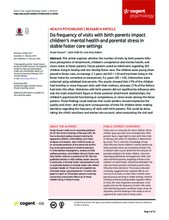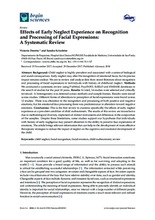Displaying 241 - 250 of 506
The aim of this study was to investigate 60 foster parents' acceptance, commitment and awareness of influence to their early placed foster children at 2 years, as well as to investigate the association between these three concepts and the foster children's social-emotional functioning (externalizing, internalizing, dysregulation and competence) at 2 and 3 years of age.
This study explored whether trust in caregiver support and communication about experiences with primary caregivers, are associated with Child Welfare System (CWS) youngsters’ depressive symptoms and/or self-harm.
This article explores whether the number of visits by birth parents influence perceptions of attachment, children’s competence and mental health, and stress levels in foster parents.
This study evaluates the ‘Nurturing Attachment’ program in the UK, a Dyadic Developmental Psychotherapy intervention for adoptive families.
The present study concerning domestic adoption explored the adjustment of 37 adolescents and 22 emerging adults (with age ranging between 11 and 18 and 18 and 24 years, respectively), adopted through an Italian form of open adoption, and analyzed the quality of adoptive family relationships and adoptees' attachment as possible moderating variables in the relation between multiple pre-adoptive risk factors and adoptees' outcomes.
The purpose of this study was to assess the perspective of social service providers who participated in a nine-month, trauma-informed care (TIC) training intervention on 1) their capacity to make referrals to trauma-specific services following the training, and 2) factors external to the training intervention that supported or hindered their ability to link traumatized youth with services.
This article reviews and analyzes data from recent literature about recognition and processing of facial expressions in individuals with history of childhood neglect.
This comprehensive reference offers a robust framework for introducing and sustaining trauma-responsive services and culture in child welfare systems.
The aim of this study was to examine the outcomes of out-of-home placement in adolescence.
In this paper, the authors review published literature on the mental health status of mothers living with HIV (MLH) and how this affects their children; outline the pathways between maternal HIV, maternal mental health problems, and negative child outcomes; and then describe a number of intervention entry points that they argue have the potential to enhance impact across PEPFAR platforms.



